
Lashkar-e-Taiba is a Pakistan-based terrorist group, militant and Islamist Salafi jihadist organisation. Described as one of Pakistan's "most powerful jihadi groups", it is most infamous outside Pakistan. The organisation's primary stated objective is to merge the whole of Kashmir with Pakistan. It was founded in 1985–86 by Hafiz Saeed, Zafar Iqbal Shehbaz Abdullah Azzam and several other Islamist mujahideen with funding from Osama bin Laden during the Soviet–Afghan War. It has been designated a terrorist group by numerous countries.

The Insurgency in Balochistan is an insurgency or revolt by Baloch separatist insurgents and various Islamist militant groups against the governments of Pakistan and Iran in the Balochistan region, which covers the Pakistani province of Balochistan, Iranian province of Sistan and Baluchestan, and Balochistan of southern Afghanistan. Rich in natural resources, this is the largest, least populated and least developed province in Pakistan and Iran, and armed groups demand greater control of the province's natural resources and political autonomy. Baloch separatists have attacked civilians from other ethnicities throughout the province. In the 2010s, attacks against the Shia community by sectarian groups—though not always directly related to the political struggle—have risen, contributing to tensions in Balochistan. In Pakistan, the ethnic separatist insurgency is low-scale but ongoing mainly in southern Balochistan, as well as sectarian and religiously motivated militancy concentrated mainly in northern and central Balochistan.

Hafiz Muhammad Saeed is a Pakistani Islamist, who co-founded Lashkar-e-Taiba (LeT), a Pakistan-based Islamist militant organization that is designated as a terrorist group by the United Nations Security Council, India, the United States, the United Kingdom, the European Union, Australia, and Russia. He is listed on India's NIA Most Wanted. In April 2012, the United States placed a bounty of US$10 million on Saeed for his role in the 2008 Mumbai attacks that killed 166 civilians. While India officially supported the American move, there were protests against it in Pakistan.

The Balochistan Liberation Army, is a Baloch ethnonationalist militant separatist organization based in Afghanistan. BLA's first recorded activity was during the summer of 2000, after it claimed credit for a series of bombing attacks on Pakistani authorities. BLA is listed as a terrorist organization by Pakistan, the United Kingdom, and the United States.
Sectarian violence in Pakistan refers to violence directed against people and places in Pakistan motivated by antagonism toward the target's religious sect. As many as 4,000 Shia are estimated to have been killed in sectarian attacks in Pakistan between 1987 and 2007, and thousands more Shia have been killed by Salafi extremists from 2008 to 2014, according to Human Rights Watch (HRW). Sunni Sufis and Barelvis have also suffered from some sectarian violence, with attacks on religious shrines killing hundreds of worshippers, and some Deobandi leaders assassinated. Pakistan minority religious groups, including Hindus, Ahmadis, and Christians, have "faced unprecedented insecurity and persecution" in at least two recent years, according to Human Rights Watch. One significant aspect of the attacks in Pakistan is that militants often target their victims places of worship during prayers or religious services in order to maximize fatalities and to "emphasize the religious dimensions of their attack".

The Pakistani Taliban, formally called the Tehreek-e-Taliban-e-Pakistan, is an umbrella organization of various Islamist armed militant groups operating along the Afghan–Pakistani border. Formed in 2007 by Baitullah Mehsud, its current leader is Noor Wali Mehsud, who has publicly pledged allegiance to the Afghan Taliban. The Pakistani Taliban share a common ideology with the Afghan Taliban and have assisted them in the 2001–2021 war, but the two groups have separate operation and command structures.

The Lashkar-e-Jhangvi, is a Deobandi supremacist, terrorist and militant organisation based in Afghanistan. The organisation operates in Pakistan and Afghanistan and is an offshoot of anti-Shia party Sipah-e-Sahaba Pakistan (SSP). The LeJ was founded by former SSP activists Riaz Basra, Malik Ishaq, Akram Lahori, and Ghulam Rasool Shah.
Ehsanullah Ehsan is a former spokesman of Tehreek-e-Taliban Pakistan (TTP) and later Jamaat-ul-Ahrar. As a spokesperson of the groups, Ehsan would use media campaigns, social media networks and call up local journalists to claim responsibility for terrorist attacks on behalf of the groups. He was initially a spokesman for the Tehreek-e-Taliban Pakistan (TTP). In 2014, he left TTP after he had developed ideological differences with the TTP leadership following the appointment of Fazlullah as the leader of the group. He later co-founded Jamaat-ul-Ahrar and became its spokesman. In 2015, as a spokesman of Jamaat-ul-Ahrar, he condemned Fazlullah-led Tehrik-e-Taliban attack on a school in Peshawar.
This is a list of terrorist incidents in Pakistan in 2012. Pakistan has faced numerous attacks by insurgents as a result of the ongoing War in North-West Pakistan by the Pakistani military against militant groups, part of the War on Terror. At the same time, there have also been numerous drone attacks in Pakistan carried out by the United States which exclusively target members of militant groups along the Afghan border regions.

Human rights abuses in the province ofBalochistan refers to the human rights violations that are occurring in the ongoing insurgency in Balochistan. The situation has drawn concern from the international community, The human rights situation in Balochistan is credited to the long-running conflict between Baloch nationalists and Pakistani security forces.

The persecution of Hazaras in Quetta, is a series of ethnic or religious motivated attacks on Hazaras in Quetta, Pakistan.
Sayed Zabiuddin Ansaria.k.a.Abu Hamza or Abu Jundal is an Indian Islamic militant belonging to Indian Mujahideen and Lashkar-e-Taiba. He is accused of being involved in 2008 Mumbai attacks. Zabiuddin Ansari 's name was listed in the list of "50 most wanted criminals sheltered in Pakistan" released by India on 21 May 2011. He served as the handler of the 10 LeT terrorists during 2008 Mumbai attacks.
This is a list of terrorist incidents in Pakistan in 2013. Some of the incidents are sectarian in nature and the TTP is responsible for a majority of them.
On 16 February 2013, at least 91 people were killed and 190 injured after a bomb hidden in a water tank exploded at a market in Hazara Town on the outskirts of Quetta, the capital city of Balochistan, Pakistan. Most of the victims were members of the predominantly Shia Twelver ethnic Hazara community, and authorities expected the death toll to rise due to the large number of serious injuries. The Lashkar-e-Jhangvi group claimed responsibility for the blast, the second major attack against the Shia Hazaras in a month.
Chaudhary Aslam Khan Swati was a Pakistani police officer. From 2005 to 2014 Aslam arrested and killed terrorists, gangwar-criminals, target killers and extortionists belonging to the Tehrik-i-Taliban Pakistan (TTP), Balochistan Liberation Army (BLA), TMP, Lashkar-e-Jhangvi (LJ), Lashkar-e-Taiba (LeT) and Sipah-e-Sahaba Pakistan (SSP). On 9 January 2014, he was killed in a bomb blast carried out by the TTP.

On 15 March 2015, two explosions took place at Roman Catholic Church and Christ Church during Sunday service in Youhanabad, Lahore, Pakistan. At least 15 people were killed and seventy were wounded in the attacks.
Terrorist incidents in Pakistan in 2017 include, in chronological order:
Operation Radd-ul-Fasaad is a codename of a combined military operation by the Pakistani military in support of local law enforcement agencies to disarm and eliminate the terrorist sleeper cells across all states of Pakistan, started on 22 February 2017. The operation is aimed to eliminate the threat of terrorism, and consolidating the gains of Operation Zarb-e-Azb which was launched in 2014 as a joint military offensive. It is further aimed at ensuring the security of Pakistan's borders. The operation is ongoing active participation from Pakistan Army, Pakistan Air Force, Pakistan Navy, Pakistan Police and other Warfare and Civil Armed Forces managed under the Government of Pakistan. More than 375,000 operations have been carried out against terrorists so far. This operation has been mostly acknowledged after Operation Zarb e Azb.
Terrorist incidents in Pakistan in 2018 include:
On 23 June 2021, a car bomb exploded in Lahore, Punjab, Pakistan, killing three people.









